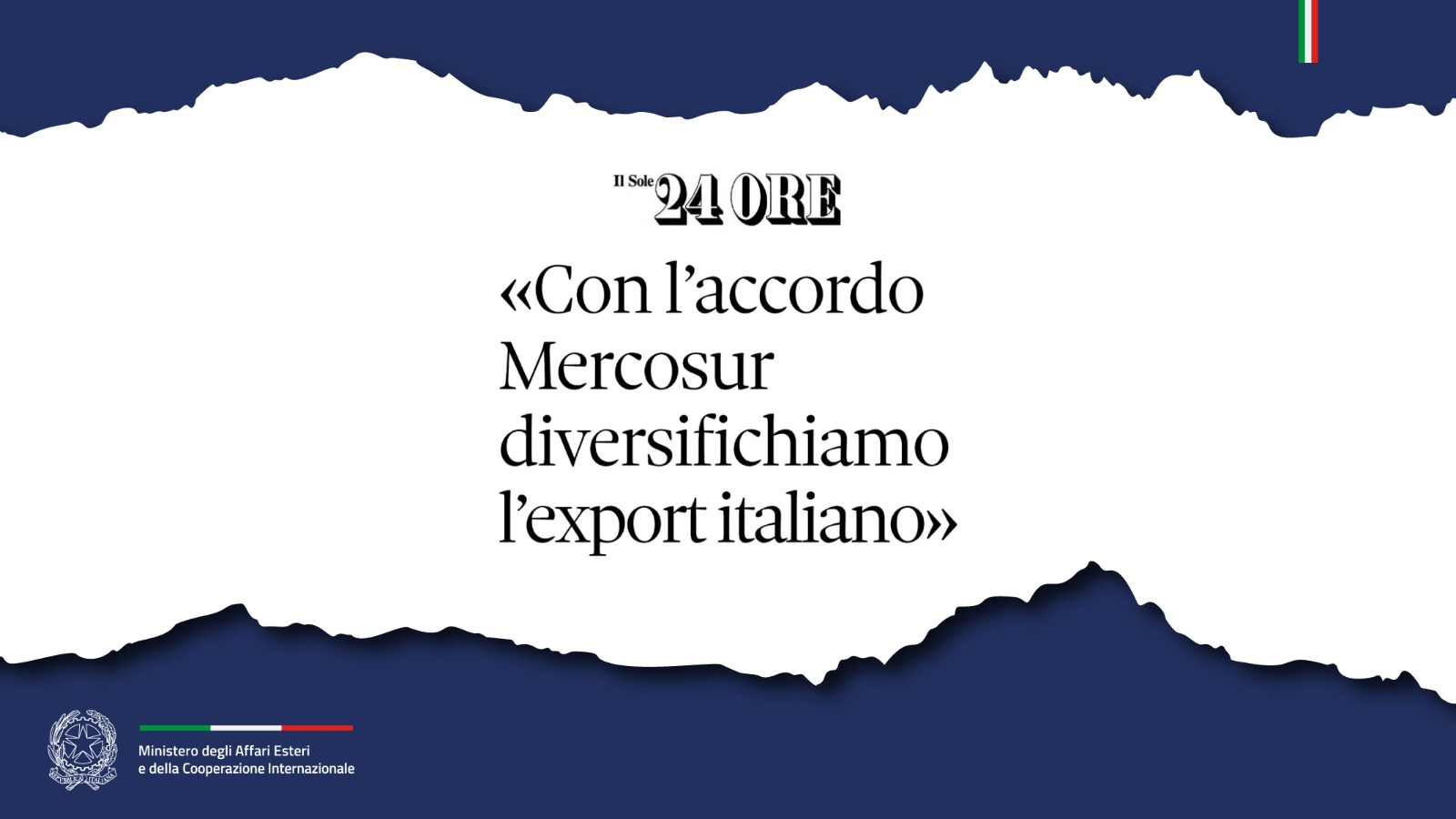Minister Antonio Tajani: the EU-Mercosur agreement is a step forward in consolidating trade arrangements. In this case, with an immense market of four countries and 800 million people, historically bound to Italy.
It is more than a step forward: it is the largest agreement ever negotiated by the Union, a milestone in relations between Europe and Latin America, not only for its trade dimension, but also for the political ties that connect us to this part of the world. The presence of large Italian communities in these countries is significant and represents an additional asset we can leverage. It is also the outcome of the substantial work carried out in close synergy with Prime Minister Giorgia Meloni and Minister Francesco Lollobrigida. It is a success for Italy.
The objective also has a strong political significance: moving towards the elimination of tariffs at a historical moment that sees the return of tariffs by Trump’s United States against the EU and other major markets. This has consequences not only at trade level, but also politically, through a strategic pact focusing on the American continent.
Italy and Europe have always supported free trade based on common rules. The expansion of the EU network of free trade agreements is for us a strategic imperative that strengthens our exports, while adding increasingly solid markets alongside that of the United States. We support agreements such as those with Mercosur, with Mexico, and the one currently under negotiation with India. And it is no coincidence that, since the beginning of my mandate, I have carried out many missions in these countries. These agreements are indispensable for ensuring Italy’s growth and decisive prosperity. This is an important component of the Government’s strategy to reach, by 2027, the target of EUR 700 billion in exports (currently EUR 623 billion), which complements the reform of the Ministry of Foreign Affairs and the significant work on tariffs.
One reading – which in these days takes on particular significance – is that the agreement offers a way out of dependence on China, especially for critical minerals.
China remains an important partner and a source of supply on which we intend to continue to rely. It is no coincidence that on 8 October in Milan we will hold a joint meeting with the Chinese Government to address the political and economic aspects of our relations. But recent events – not least the pandemic – remind us that economic security is best ensured by a strategy of diversification. That is why Latin America can play a fundamental role. Not only Mercosur, but also Chile, the Andean countries and Central America. With each of them, the EU has signed agreements that can help mitigate certain strategic dependencies.
One of the main issues concerns the guarantees in the agricultural sector, which delayed the agreement and generated resistance in other EU countries, such as France, but also Poland and Austria, among others. This is referred to as “enhanced monitoring”.
Italy was decisive in working with the Commission to secure not only monitoring of the effects of imports on our agricultural sector, but also safeguards for the most sensitive products, already protected by the import quota regime. There will be an enhanced monitoring system for potential market disruptions. There will be stricter sanitary checks to ensure compliance with European standards and regulations. There will be compensation for companies that may be adversely affected. A system for protecting the agricultural sector that is not present in any other European trade agreement. Thanks to our action, an unprecedented result has been achieved. No other trade agreement signed by the Union provides such a broad and structured level of protection to take into account agricultural sensitivities.
The agricultural sector nonetheless remains highly critical: it considers the safeguard clauses, including food security, insufficient. Many insist on the principle of reciprocity.
Reciprocity cannot mean imposing our production standards on our partners. But it is a concept that must apply to product standards that imports from Mercosur must meet in terms of sanitary and phytosanitary measures – standards which are in no way weakened by the agreement reached. Furthermore, we have requested that the Commission strengthen monitoring and checks on products entering the Union from Mercosur countries, to ensure there can be no doubt regarding food safety and the quality of imported products.
Another element is the guarantee of geographical indications to prevent imitations: in other words, no “Parmesan” in a Latin American version.
Since the beginning of my mandate, I have made the fight against Italian sounding products a constant commitment: with this agreement we obtain protection for 57 Italian Geographical Indications currently lacking any protection in those countries. This is another major achievement, which will allow us to safeguard and further promote the excellence of our territories.
From the wine sector, the attitude is different: at present they pay a 27% tariff.
The wine industry has long expressed support for the agreement, being well aware of the considerable opportunities for market penetration in those countries. However, this is not limited to wine. The substantial reduction or elimination of tariffs on agri-food products applies to a wide range of products from our sector, such as cheeses.
Beyond agri-food, a sector that should particularly benefit is automotive (currently facing 35% tariffs), along with machinery and pharmaceuticals – all strategic components of our national economy.
In addition to these, Italian chemicals should not be overlooked, as they too will derive great benefit from the agreement. Overall, a strong boost to our exports towards these countries can be expected.
The Italian Government has reserved the right to assess the effectiveness of the additional safeguards. But the course is, we believe, now set and irreversible.
The Government is seriously assessing the agreement in its entirety. We have always been aware of the potential of the deal and of the sensitivities of our agricultural sector, to which we have always paid heed. We welcome the Commission’s proposals for additional safeguards beyond those already included in the agreement, which are moving in the direction we have advocated. We must now continue to fine-tune and monitor the results.





